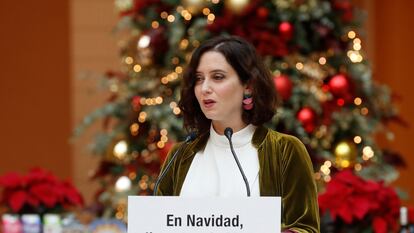Madrid rules out stricter Christmas restrictions despite coronavirus fears
While other regions are considering tougher measures for the holiday season, Isabel Díaz Ayuso says there will no additional rules on shops or the hostelry sector

The premier of Madrid, Isabel Díaz Ayuso, announced on Thursday that the region is not considering stricter restrictions for the Christmas period, despite concerns about the rising number of coronavirus cases there.
The news comes after Spanish Prime Minister Pedro Sánchez called on Wednesday for tougher rules to be introduced in regions where the coronavirus incidence rate is on an upward trend, which includes Madrid.
But Díaz Ayuso has ruled out such a move, indicating that the Madrid government will only follow the current restrictions set by the Spanish Health Ministry two weeks ago. Under the Health Ministry’s national Christmas plan, which was approved by a council made up of central and regional health officials, all regions in mainland Spain must seal their borders between December 23 and January 6. Citizens are only allowed to travel to a different region during this time if they are visiting family or close friends.
“We are going to follow the rules, but we won’t be the ones stopping citizens from entering or leaving the Madrid region, whether to see their family, to work or for medical reasons,” Díaz Ayuso told the Madrid regional assembly. Travel for these reasons, however, has never been in question. Under the current state of alarm, any citizen is allowed to cross regional borders for essential business.
The regional leader added that stores, bars and restaurants in Madrid will not be closed during the holiday period. “We are not planning on ruining businesses or closing the hospitality sector,” said Díaz Ayuso of the conservative Popular Party (PP), who governs in coalition with Ciudadanos (Citizens) and the support of the far-right Vox. “We are going to apply sensible measures and in the meantime, observe how the pandemic evolves.”
But there is concern about the upward trend of transmission rates in the Madrid region. “The question is not if there will be a third wave [of the pandemic], but how hard it will hit,” said Madrid deputy premier, Ignacio Aguado, from Ciudadanos.
We know that there are two things that favor the spread of the virus: mobility and closed space. We must avoid thisÓscar Zurriaga, vice president of the Spanish Epidemiology Society.
On December 9, the 14-day cumulative number of cases per 100,000 inhabitants fell to 190.95. But since then, the incidence rate has been steadily rising. According to the latest report from the Health Ministry, the 14-day cumulative number of cases per 100,000 inhabitants in Madrid now stands at 248.4, above the national average of 201.16 and the 250-threshold considered by the ministry to indicate a situation of “extreme risk.” After the Canary Islands and the Balearic Islands – where strict measures have been introduced in the most affected areas – Madrid is the region that has seen the sharpest increase in cases, with new infections rising 30% in the past seven days.
Contagions in basic healthcare zones – administrative units that include one or more primary health centers – have spiked 40% over the past two weeks. In 62 of the region’s 286 healthcare zones, the 14-day cumulative number of cases per 100,000 inhabitants exceeds 250. Under the region’s current criteria, a healthcare zone is placed under a perimetral lockdown if the incidence rate is above 400 cases.
Unlike Madrid, some regional authorities have already introduced stricter measures, and it is likely that tougher restrictions will be announced in the coming hours in parts of Spain with a high incidence rate. On Wednesday, the acting premier of Catalonia Pere Aragonès said he would not hesitate to take a step back from the region’s reopening plan if it is considered necessary. And in the Valencia region, health department chief Ana Barceló said that regional officials will analyze the situation on Thursday to determine whether new restrictions are required.
Any changes are likely to affect travel dates, size of gatherings, curfew times and public events. Several experts have asked for travel to be banned altogether during the Christmas period. “We know that there are two things that favor the spread of the virus: mobility and closed spaces. We must avoid this,” said Óscar Zurriaga, the vice president of the Spanish Epidemiology Society.
Ana María García, professor of public health at Valencia University, agreed: “At the very least, we have to strengthen the message that you can’t travel and it would be ideal if there were no gatherings between different household groups.”
With reporting by Pablo Linde.
English version by Melissa Kitson and Susana Urra.
Tu suscripción se está usando en otro dispositivo
¿Quieres añadir otro usuario a tu suscripción?
Si continúas leyendo en este dispositivo, no se podrá leer en el otro.
FlechaTu suscripción se está usando en otro dispositivo y solo puedes acceder a EL PAÍS desde un dispositivo a la vez.
Si quieres compartir tu cuenta, cambia tu suscripción a la modalidad Premium, así podrás añadir otro usuario. Cada uno accederá con su propia cuenta de email, lo que os permitirá personalizar vuestra experiencia en EL PAÍS.
¿Tienes una suscripción de empresa? Accede aquí para contratar más cuentas.
En el caso de no saber quién está usando tu cuenta, te recomendamos cambiar tu contraseña aquí.
Si decides continuar compartiendo tu cuenta, este mensaje se mostrará en tu dispositivo y en el de la otra persona que está usando tu cuenta de forma indefinida, afectando a tu experiencia de lectura. Puedes consultar aquí los términos y condiciones de la suscripción digital.









































